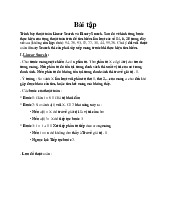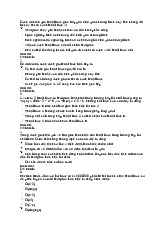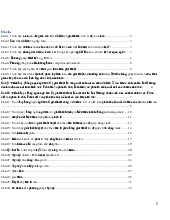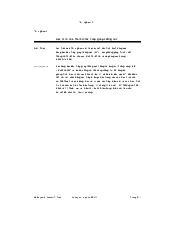













Preview text:
Laboratory Data Structures
Supervisor: Nguyễn Huỳnh Nhật Thương Class: 21ES
Group 3: Nguyễn Quang Thạc Trần Văn Thanh Nhật
Trần Nguyễn Hoài Nam Phạm Văn Tiên // Selection sort in C++ #include #include #include using namespace std;
// function to swap the the position of two elements void swap1(int *a, int *b) { int temp = *a; // 0(1) *a = *b; // 0(1) *b = temp; // 0(1) } // function to print an array
void printArray(int array[], int size) {
for (int i = 0; i < size; i++) {
cout << array[i] << " "; // 0(1) } cout << endl; // 0(1) }
void selectionSort(int array[], int size) {
for (int step = 0; step < size - 1; step++) { int min_idx = step; // 0(1)
for (int i = step + 1; i < size; i++) // 0(2n) {
// To sort in descending order, change > to < in this line.
// Select the minimum element in each loop.
if (array[i] < array[min_idx]) // 0(1) {min_idx = i;} // 0(1) }
// put min at the correct position
swap1(&array[min_idx], &array[step]); // 0(3) } } // insertion sort
void insertionSort(int array[], int size) {
for (int step = 1; step < size; step++) // 0(2n^2 + 3n) {
int key = array[step]; // 0(1) int j = step - 1; // 0(1)
// Compare key with each element on the left of it until an element smaller than // it is found.
// For descending order, change keyarray[j].
while (key < array[j] && j >= 0) // 0(2n) {
array[j + 1] = array[j]; // 0(1) --j; // 0(1) } array[j + 1] = key; // 0(1) } } // quick sort void swap(int *a, int *b) { int t = *a; *a = *b; *b = t; }
int partition(int array[], int low, int high) {
// select the rightmost element as pivot int pivot = array[high];
// pointer for greater element int i = (low - 1);
// traverse each element of the array
// compare them with the pivot
for (int j = low; j < high; j++) { if (array[j] <= pivot) {
// if element smaller than pivot is found
// swap it with the greater element pointed by i i++;
// swap element at i with element at j
swap(&array[i], &array[j]); } }
// swap pivot with the greater element at i
swap(&array[i + 1], &array[high]); // return the partition point return (i + 1); }
void quickSort(int array[], int low, int high) { if (low < high) {
// find the pivot element such that
// elements smaller than pivot are on left of pivot
// elements greater than pivot are on righ of pivot
int pi = partition(array, low, high);
// recursive call on the left of pivot
quickSort(array, low, pi - 1);
// recursive call on the right of pivot
quickSort(array, pi + 1, high); } } // buble sort
void bubbleSort(int array[], int size) {
// loop to access each array element
for (int step = 0; step < (size - 1); ++step) { // check if swapping occurs int swapped = 0;
// loop to compare two elements
for (int i = 0; i < (size - step - 1); ++i) { // compare two array elements
// change > to < to sort in descending order
if (array[i] > array[i + 1]) {
// swapping occurs if elements // are not in intended order int temp = array[i]; array[i] = array[i + 1]; array[i + 1] = temp; swapped = 1; } }
// no swapping means the array is already sorted
// so no need of further comparison if (swapped == 0) break; } } // merge sort
void merge(int arr[], int p, int q, int r) {
// Create L ← A[p..q] and M ← A[q+1..r] int n1 = q - p + 1; int n2 = r - q; int L[n1], M[n2];
for (int i = 0; i < n1; i++) L[i] = arr[p + i];
for (int j = 0; j < n2; j++) M[j] = arr[q + 1 + j];
// Maintain current index of sub-arrays and main array int i, j, k; i = 0; j = 0; k = p;
// Until we reach either end of either L or M, pick larger among
// elements L and M and place them in the correct position at A[p..r]
while (i < n1 && j < n2) { if (L[i] <= M[j]) { arr[k] = L[i]; i++; } else { arr[k] = M[j]; j++; } k++; }
// When we run out of elements in either L or M,
// pick up the remaining elements and put in A[p..r] while (i < n1) { arr[k] = L[i]; i++; k++; } while (j < n2) { arr[k] = M[j]; j++; k++; } }
// Divide the array into two subarrays, sort them and merge them
void mergeSort(int arr[], int l, int r) { if (l < r) {
// m is the point where the array is divided into two subarrays int m = l + (r - l) / 2; mergeSort(arr, l, m); mergeSort(arr, m + 1, r); // Merge the sorted subarrays merge(arr, l, m, r); } } // driver code int main() { int data1[10000]; // 0(1)




